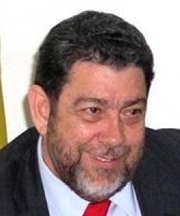
KINGSTOWN, St. Vincent — The Unity Labour Party (ULP) government has tabled before lawmakers an estimates of EC$913.5M (US$338.3M) for 2010 as opposition supporters protested outside the Parliament building.
Prime Minister and Minister of Finance Dr. Ralph Gonsalves, in tabling the estimates, also announced several initiatives he said were aimed at improving the overall work of the central government.
The 2010 estimates reflect a 20 percent increase over last year’s figure. Recurrent expenditure, including amortization, accounted for EC$610.17M (US$226M), an increase of EC$55M (US$20.4) or 9.9 percent more than 2009.
Current expenditure for 2010 was predicted to be EC$523M (US$193.7M) and amortization EC$87M.
Capital expenditure for the 2010 fiscal year was estimated at EC$303.3M (US$112.3M) an increase of 53.7 percent or EC$106M (US$39.3M) over last year’s spending.
“3 big projects”
Gonsalves, whose Unity Labour Party (ULP) might face the electorate for a third consecutive term in office this year, said the large increase in planned spending was “not at all unmanageable”.
He said that there were “three big projects” that accounted for EC$113M (41.9) or 37.2 percent of the capital budget.
They are a financial stabilisation programme of EC$40M (US14.8M), SVG’s equity contribution to the successor of the cash strapped British American Insurance, the Argyle International Airport — EC$54M (US$20M) — and the purchase of three coast guard vessels for EC$19.1M (US$7M).
There was a current account deficit of EC$20.5M (US7.6M), which he attributed to a “weakening of current revenue collection in 2009”.
(Follow I Witness-News on Facebook)
This “dampened revenue growth expectations in the 2010 fiscal year and new programmes of recurrent expenditure in the 2010 budget, which are absolutely necessary,” he said.
Between 2006 and 2009, SVG recorded an average annual growth in current revenue of 9.1 percent. However, Gonsalves announced a “conservative estimate” of 3.7 percent for 2010, citing the global economic crisis.
He said that his administration made strenuous efforts to curb spending in 2009. However, in the first half of the year, current expenditure increased by 11.2 percent.
The tightening of expenditure control measures in the second half of the year resulted in a slowing of the rate of spending to 5.2 percent, he said.
National debt
Gonsalves announced that as of Sept. 30, 2009 the national debt of SVG had increased by 10.2 percent to EC$1.19B (US$400M), 75.4 percent of GDP.
He attributed the increase to the 18 percent — EC$90.2M (US$33.4M) — increase in domestic debt and 3.3 percent — EC$19.27M (US$7.13M) — increase in external owing.
He estimated that EC$149M (US$55M) — 30 percent of recurrent revenue — would be needed to service the national debt in 2010.
“As the public debt profile matures, it is expected that amortisation will increase in the medium term. The government debt-management strategy is crafted to take into account this plan,” Gonsalves said.
“However, even as amortisation rises, the effective cost of the debt remains low,” he added. “In 2009, the effective interest rate on the public debt was 4 percent.”
This year, government is also expected to pay 3.5 percent — $EC8M (US$3M)–more in wages and salaries, which will account for EC$237M (US$87.8)for the recurrent budget and debt service will take EC$149M (US$55M).
“Anybody who is listening can see what is the focus of this budget: education, health, poverty reduction, economic affairs and making sure that we are safe and well governed.
“That is what the recurrent budget is about,” he said after detailing the allocations.
Revenue decline
Gonsalves said that while his administration took steps to moderate the impact of the revenue decline on the fiscal situation, it had to consider two factors.
“…The need to provide for a much needed stimulus to the economy, which had fallen prey to the global economic meltdown, and the need to enhance social safety nets in an effort to protect gains made in reducing poverty,” he said in the address broadcast live on radio and television.
“We are being very cautious, even more cautious than usual on our estimates of the revenue given the international situation,” he said, a reference to the global financial crisis.
Among the initiatives Gonsalves announced were the addition of 65 graduate teachers to the primary education system and seven recurrent spending programmes.
These programmes include a support system for students with behavioural problems, a banana services unit, and a crisis centre providing temporary shelter, counselling and other assistance to victims of domestic abuse.
“Are we so poor; are things so tight that we can’t put a programme — this year — in place for our victims of domestic violence to get short-tem shelter, counselling and other assistance?” Gonsalves asked.
He also announced that 18 early childhood centres will be opened at certain primary schools across the country and that EC$149,000 (US$55,000) will be allocated annually to the Office of the Leader of the Opposition.
He further said that the age of retirement of corporal will be increased from 50 to 55 years and that policewomen will be granted maternity leave on par with other public service workers. They only get one month maternity leave currently.
Police officers will also be entitled to paternity leave, the Minister of National Security announced.
Gonsalves, at the beginning of his address, dismissed as “foolish propaganda” claims that the lateness of the budget showed that his government was “delinquent”.
He said the tabling of the budget in January rather than the customary December was “perfectly constitutional” and happened because of the constitution referendum last November.
Opposition supporters gathered outside the Parliament building, highlighting what their New Democratic Party public relations officer Vynnette Frederick said were “the major issues confronting the nation”.
She said chief among these were the state of the voters’ list ahead of general elections, the purported money transaction of more than US$1M (EC$2.7M) involving ULP executive members and members of their family and the state of our nation’s economy.
The debate continues.





